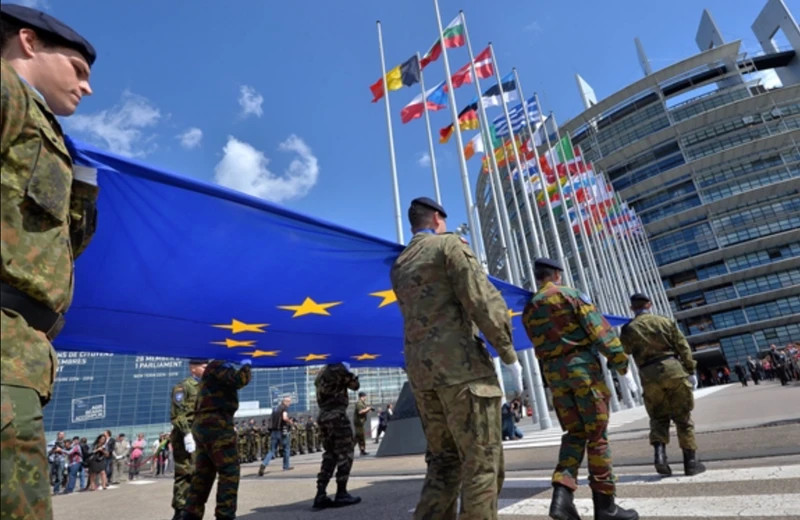Improving response capacity
Developing appropriate and mutually beneficial cooperative relationships is an important pillar of the EU’s security and defence efforts, as highlighted in the EU “Strategic Compass” initiative. “Strategic Compass” is a non-binding political cooperation framework tailored to selected partners, and it structures a broad and deep relationship with the EU in all areas of promoting peace, security and defence.
With the “Strategic Compass”, the EU aims to improve self-reliance faster, stronger and more flexible, to self-fulfil responsibility for ensuring security and managing crises. The EU will continue to expand and deepen partnerships in line with common values and interests, typically through developing a strategic partnership between the EU and the United Nations on peace and security, and a strategic partnership with the North Atlantic Treaty Organization (NATO).
In the context of an unprecedentedly complicated world situation, with many overlapping threats and challenges, such as the conflict in Ukraine, escalating tensions in the Middle East, the Sahel region and many other regions around the world, the EU faces the urgent task of improving its ability to respond to risks, and at the same time strengthening its ability to react quickly to crises.
The recent EU defence ministers’ meeting in Brussels (Belgium) welcomed the EU’s Common Security and Defence Policy (CSDP) and activities worldwide, including the launch of EUNAVFOR ASPIDES, to fight human trafficking in the Mediterranean. The EU Military Council also emphasised the importance of the European Peace Facility (EPF) as a global support tool, encouraging member states to contribute to the EU’s rapid deployment capacity by 2025.
EU ministers affirmed the importance of strengthening the EU’s prevention, detection, deterrence and response capabilities to threats, such as cyberattacks and disinformation. The space, maritime and aviation sectors are significant in the EU’s security and defence. Last March, the EU announced the bloc’s first defence industry strategy, aiming to strengthen cooperation among member countries in investment, research, development and procurement of defence equipment. The plan also seeks to consolidate cooperation between the EU and countries with similar interests.
Strengthening partnerships
In addition to priorities to promote defence capabilities, the EU also focuses on strengthening the development of important partnerships. The EU and Norway signed a new security and defence partnership agreement. This is a new step forward in bilateral relations, contributing to collective security that benefits Norwegian and EU citizens. The agreement covers existing areas of cooperation, and Norway’s participation in missions and activities within the CSDP framework and EU defence initiatives. In addition, this partnership also promotes practical cooperation in areas such as maritime security, cyber security, and preventing information manipulation and interference from abroad.
Meanwhile, the EU and India have established several dialogues on defence and security to improve cooperation with Indo-Pacific countries. The group of 27 countries has also cooperated with the South Asian country in the CRIMARIO project, to focus on enhancing maritime awareness capacity for Indo-Pacific countries. India also coordinates with the EU in the EU-funded Enhancing Security with Asia and in Asia (ESIWA) project, building cooperation on cyber security, counter-terrorism and maritime security. The two sides recently strengthened security cooperation, with their first joint naval exercises in the Gulf of Guinea. India also participated in the EU’s Operation Atalanta exercise in the northwest Indian Ocean. The EU’s security and defence cooperation with India and its engagement across the Indo-Pacific are increasing.
EU Special Envoy for the Indo-Pacific Richard Tibbels, said that the EU’s defence and security cooperation with India in the Indo-Pacific is expected to rise, in the context of the worsening security environment in the region. India and the EU upgraded their bilateral relationship to a strategic partnership in 2004. Still, defence and security have recently become a major part of the agenda, which is especially important amid signs of cracking in regional security in the Indo-Pacific region. Tibbels emphasised that the EU is interested in the Indo-Pacific region, where independent countries have enough strength to protect their national interests. As the world faces major geopolitical turning points, the EU considers India an important partner in implementing the Indo-Pacific Strategy.
In its partnership with Japan and the Republic of Korea, the EU considers cooperation in areas such as space, cyber security, maritime security and prevention of disinformation. As for Japan, there has been a proposal to expand opportunities for Japanese companies to participate in research and development programmes in the defence sector, led by the EU. The EU can provide capital for joint projects between Japanese and European companies. In addition, the plan also includes cooperation on disarmament and nuclear non-proliferation issues.
The EU looks forward to strengthening cooperation with important partners to demonstrate its strong commitment to enhancing security and stability in the region and globally. With the strategic orientation on security and defence approved in March, the EU aims to become an organisation with greater capacity, able to provide stronger security guarantees, thereby strengthening and enhancing strategic autonomy, as well as the ability to coordinate with partners to protect the values and interests of the alliance. Faced with increasing threats and challenges, the EU is increasingly improving its capacity to act decisively in crises, and being more proactive in protecting the security of the union and the region.
















